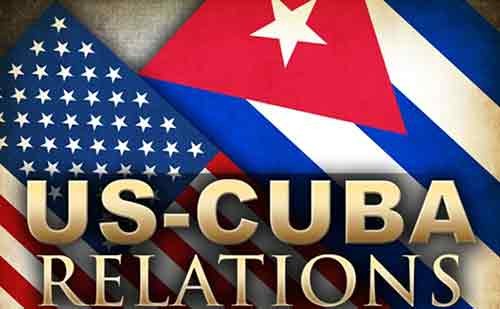
December 26, 2014
President Obama’s move to normalize relations with Cuba deserves applause. Normalization, however, will not be complete until the U.S. ends its economic embargo and returns Guantánamo Bay to Cuba.
Normalization, as announced by President Obama includes, among other things, establishing diplomatic relations with Cuba, expansion of travel to Cuba, raising remittance levels from $500 to $2,000, expanding commercial exports/sales from the U.S. to Cuba, allow U.S. citizens to import additional goods from Cuba, U.S. credit and debit cards will be permitted to be used by travelers to Cuba, initiating efforts to increase Cubans’ access to communications, and U.S. review of Cuba’s designation as a State Sponsor of Terrorism.
According to Obama, the normalization will include continued strong support by the U.S. for improved human rights conditions and democratic reforms in Cuba. Opponents of normalization argue that Cuba has a repressive regime with a poor human rights record. This concern comes on the heels of the release of the Senate Torture Report, which found, among other things, that the CIA engaged in torture such as waterboarding, shackling in painful positions, prolonged sleep deprivation, and slamming detainees against walls.
While the International Human Rights Indicator ranks Cuba 115th, India 120th, Egypt 124th, Uganda 200th, and Vietnam 204th, the U.S, which ranks 19th, does not allow travel to Cuba, but travel and trade goes on with these other countries.
The U.S. administration got along fine with Fulgencio Batista the thug Castro overthrew. Yet, Americans were free to frolic at the nightclubs, casinos and beach resorts during Batista’s thuggish regime. But then Batista was in our pocket, whereas Castro is not.
Isolating Cuba has not worked. Fidel Castro took power in Cuba in 1959 and then handed power to his brother Raúl in 2008. Thus, the Castro brothers have outlasted seven U.S. presidents.
Full normalization must include the return of Guantánamo Bay to Cuba. The Platt amendment to a U.S. Army Appropriations Bill of 1901 gave the U.S. the right to intervene militarily in Cuban affairs whenever the U.S. decided such intervention was warranted. Cubans were given the choice of accepting the Platt Amendment or remaining under U.S. military occupation indefinitely. The U.S. has intervened militarily in Cuban affairs at least three times. U.S. intervention endowed Cuba with a series of weak, corrupt, dependent governments. In 1903, the U.S. used it to obtain a perpetual least of Guantánamo Bay, a blatant example of U.S. gunboat diplomacy.
The current Cuban government considers the U.S. presence in Guantánamo to be illegal and the Cuban-American Treaty to have been procured by the threat of force in violation of international law.
Full normalization must also include lifting the trade and economic embargo against Cuba – it is nothing but a relic of the Cold War. On Feb. 3, 1962, President Kennedy signed Proclamation 3447 to declare “an embargo upon all trade between the United States and Cuba.” The night before he signed the embargo, JFK sent his Press Secretary, Pierre Salinger, to procure as many Cuban cigars as he could find. Salinger returned with a stash of 1,200 Petit Upmann cigars.
On Feb. 8, 1963, the U.S. prohibited travel to Cuba and in July of that year the Cuban Assets Control Regulations (CACR) were issued as a comprehensive economic sanction outlawing financial transactions with Cuba. The regulations also prohibit the purchase or importation of any merchandise of Cuban origin, with the exception of “information or information materials” (such as publications, recorded music, and certain artwork).
My wife and I traveled “legally” to Cuba in November 2003 on one of the last “People-to-People” tours. We visited Havana, Viñales, and Santiago de Cuba. We thoroughly enjoyed our trip, learned a lot and enjoyed meeting Cubans. Shortly thereafter, the U.S. Treasury Department stopped issuing “People-to People” licenses.
While we were in Cuba, the United Nations cast its yearly vote to end the embargo. Every nation but the U.S., Israel, and the Marquesas, voted to end the embargo. Of course, as a member of the Security Council, the U.S. has veto power. The vote was televised throughout Cuba. Last year, the UN General Assembly voted nearly-unanimously – for the twenty-second year – calling for an end to the U.S. decades-long economic, commercial and financial embargo against Cuba.
As Obama noted, “Today, America chooses to cut loose the shackles of the past so as to reach for a better future –- for the Cuban people, for the American people, for our entire hemisphere, and for the world.”
I believe that more direct contact between Americans and Cubans in Cuba will likely promote positive change in both the U.S. and Cuba.
For a detailed discussion of U.S.-Cuba relations, I recommend “Cuba Embargo-Pros and Cons.”

 The Hunger Site
The Hunger Site
No Comments
Comments for Normalization of US-Cuba Relations Begins are now closed.